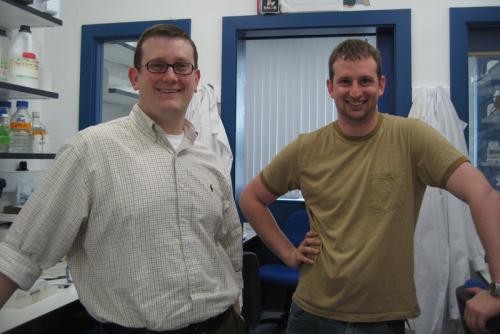
MRC Unit postdocs Jeremy Nichols and Nic Dzamko publish important new paper
There has been much interest in studying the function and regulation of the Leucine Rich Repeat Protein Kinase-2 (LRRK2) which is mutated in a significant number of Parkinson's disease patients. Progress in this area has been slow and hampered by a lack of tools to investigate the intrinsic properties, activity and function of the endogenously expressed LRRK2 enzyme.
To address these concerns, Jeremy Nichols undertook a detailed analysis of substrate preferences of LRRK2 and used this information to elaborate a new peptide substrate termed Nictide (reflecting the names of the first two authors of the paper, pictured above). Jeremy demonstrated that Nictide is vastly superior to the original LRRKtide substrate that is widely deployed to assay LRRK2. Nic Dzamko also developed the first ever antibody reagents that enable the detection of endogenous LRRK2. Employing Nictide as substrate Nic was able to develop an immunoprecipitation based assay that permits measurement of endogenous LRRK2 kinase activity. In addition, Jeremy also discovered that relatively specific Rho kinase (ROCK) inhibitors such as Y-27632 and H-1152, suppressed LRRK2 with similar potency to which they inhibited ROCK2. In collaboration with Alastair Reith's group at GlaxoSmithKline we identified GSK429286A a selective ROCK inhibitor that did not inhibit LRRK2. Using these reagents Jeremy developed a strategy to validate whether substrates are phosphorylated by LRRK2 and used this to show that LRRK2 is probably not rate-limiting for the phosphorylation of the proposed substrate moesin.
We hope that these new results will aid with dissecting the functional roles of the LRRK2 kinase and how mutations in this enzyme lead to Parkinson's disease. To read the paper describing this work please click here
To address these concerns, Jeremy Nichols undertook a detailed analysis of substrate preferences of LRRK2 and used this information to elaborate a new peptide substrate termed Nictide (reflecting the names of the first two authors of the paper, pictured above). Jeremy demonstrated that Nictide is vastly superior to the original LRRKtide substrate that is widely deployed to assay LRRK2. Nic Dzamko also developed the first ever antibody reagents that enable the detection of endogenous LRRK2. Employing Nictide as substrate Nic was able to develop an immunoprecipitation based assay that permits measurement of endogenous LRRK2 kinase activity. In addition, Jeremy also discovered that relatively specific Rho kinase (ROCK) inhibitors such as Y-27632 and H-1152, suppressed LRRK2 with similar potency to which they inhibited ROCK2. In collaboration with Alastair Reith's group at GlaxoSmithKline we identified GSK429286A a selective ROCK inhibitor that did not inhibit LRRK2. Using these reagents Jeremy developed a strategy to validate whether substrates are phosphorylated by LRRK2 and used this to show that LRRK2 is probably not rate-limiting for the phosphorylation of the proposed substrate moesin.
We hope that these new results will aid with dissecting the functional roles of the LRRK2 kinase and how mutations in this enzyme lead to Parkinson's disease. To read the paper describing this work please click here

